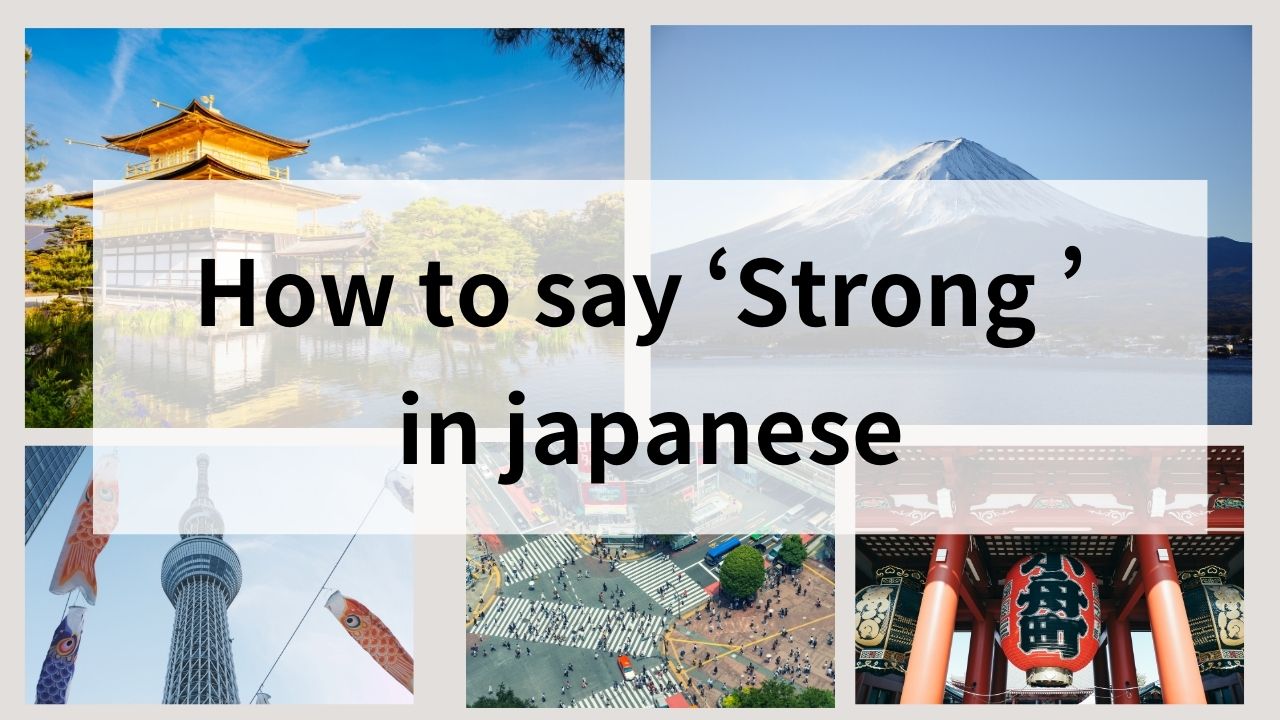Are you curious about how to say “strong” in Japanese? The concept of strength can vary significantly across cultures, encompassing physical power, emotional resilience, and moral integrity. This guide will explore the Japanese word for “strong,” its cultural significance, and practical applications.
How Do You Say “Strong” in Japanese?
The Japanese word for “strong” is 強い (tsuyoi). This term is widely recognized and used in various contexts, from describing physical strength to emotional fortitude.
The Japanese Word for Strong: Tsuyoi (強い)
“Tsuyoi” is a versatile term used to describe strength in numerous contexts. For example:
- 強い力 (Tsuyoi chikara): “Strong power.”
- 強い意志 (Tsuyoi ishi): “Strong will.”
- 強い風 (Tsuyoi kaze): “Strong wind.”
Kanji for Strong: 強
The kanji for strong, 強, is commonly used in literature, everyday language, and various expressions. This character conveys a sense of robustness and intensity. The primary reading for this kanji is つよい (Tsuyoi), and it also has an alternative reading, きょう (Kyou), which appears in compound words.
Examples of words containing the kanji 強 include:
- 強化 (Kyouka): “Strengthening,” often used in contexts like skills or training.
- 強盗 (Goutou): “Robbery,” where strength is associated with aggressive actions.
- 強烈 (Kyouryoku): “Intense” or “strong,” typically used to describe sensations or emotions.
The kanji is associated with things that are robust or powerful, helping learners understand the nuanced use of 強 in Japanese.
Does “Strong” Work in Japanese?
The English word “strong” is generally understood in Japan, especially among younger generations or those familiar with fitness and modern culture. However, its recognition might be less universal among older individuals or in more traditional contexts. A 5-point scale rates its comprehension as:
- Rating: 4 – Generally understood (60-80% of people)
If clarity is crucial, using the Japanese term 強い (Tsuyoi) is recommended. While “strong” may be understood in certain contexts, “tsuyoi” ensures effective communication.
The Cultural Significance of Strength in Japan
Strength holds a significant place in Japanese culture, often symbolizing resilience, honor, and moral integrity. It is a concept deeply rooted in traditional values and modern societal expectations.
Strength as a Symbol of Resilience
In Japanese culture, strength is not solely physical; it encompasses mental and emotional resilience. This notion is reflected in the Japanese proverb, 七転び八起き (Nanakorobi yaoki), meaning “fall seven times, stand up eight,” emphasizing the importance of perseverance.
Strength in Japanese Folklore and Myths
Strength appears in various Japanese myths and stories, often symbolizing heroism and virtue. Characters in folklore are frequently depicted as embodying physical and moral strength, showcasing their ability to overcome adversity.
In addition to its traditional associations, the concept of strength plays a significant role in modern Japanese pop culture, particularly in anime and manga, where characters often undergo rigorous training to become stronger. This connection emphasizes the value of personal growth and overcoming challenges.
- Dragon Ball: Characters like Goku represent physical strength and determination, as he constantly pushes his limits to become stronger.
- Naruto: Naruto Uzumaki’s journey highlights the importance of inner strength and resilience in overcoming obstacles.
- Attack on Titan: The characters exhibit both physical and emotional strength as they fight against overwhelming odds to protect humanity.
These examples demonstrate how strength continues to represent resilience and determination, bridging traditional values and modern storytelling.
Differences Between Strength in Japan and Overseas
There can be subtle differences in how “strong” is perceived in Japan compared to Western cultures. In Japan, “tsuyoi” (強い) often refers to a balanced strength that includes emotional and mental resilience, while in Western contexts, strength may be more closely associated with physical power and dominance. Understanding these cultural nuances can help avoid misunderstandings, especially when discussing strength in various contexts.
Practical Applications of “Strong” in Japanese
Learning how “strong” is used in Japanese can help you navigate conversations, understand idioms, and recognize its presence in Japanese culture.
Talking About Strength in Daily Conversation
Here are some examples of how “tsuyoi” is used in everyday conversation:
- 私は強いです (Watashi wa tsuyoi desu): “I am strong.”
- 彼は強い選手です (Kare wa tsuyoi senshu desu): “He is a strong athlete.”
Strength-Related Idioms or Expressions
There are several idioms and expressions involving “tsuyoi” that reflect the cultural appreciation of strength:
- 強い心 (Tsuyoi kokoro): “Strong heart,” symbolizing emotional resilience and determination.
- 強い絆 (Tsuyoi kizu na): “Strong bond,” referring to deep relationships and connections between people.
- 強烈な印象 (Kyouryoku na inshou): “Strong impression,” often used in contexts where something leaves a significant impact.
- 強気 (Tsuyoki): “Confident” or “assertive,” referring to someone who is strong-willed or determined.
- 強者 (Tsuyosha): “Strong person,” often used to describe individuals who exhibit remarkable strength or skill.
These idioms and expressions reflect the deep cultural appreciation for strength in Japan, often tied to themes of resilience, courage, and integrity. By learning these phrases, you can gain a deeper understanding of how strength is interwoven with Japanese language and values.
Strength in Japanese Cuisine or Products
Strength is also associated with certain aspects of Japanese cuisine and products, emphasizing health and vitality. Here are some notable examples:
- 納豆 (Natto): Fermented soybeans known for their health benefits, often associated with strength due to their high protein content.
- 黒酢 (Kurozu): Black vinegar, praised for its health properties and ability to boost energy, symbolizing vitality and strength.
- 精進料理 (Shōjin ryōri): Vegetarian cuisine that promotes health and well-being, often associated with inner strength and balance.
These examples highlight how strength is not only a physical attribute but also a vital aspect of health and well-being in Japanese cuisine.
FAQs
Here are some frequently asked questions about “strong” in Japanese culture and language.
Is Strong a Popular Concept in Japan?
Yes, strength is a widely respected concept in Japan, often associated with personal growth, resilience, and moral integrity. It is frequently celebrated in various forms of art, literature, and media.
How Do You Write “Strong” in Japanese?
The word “strong” can be written in three different scripts in Japanese: hiragana, katakana, and kanji. Each script serves different purposes depending on the context and formality. Here’s a breakdown:
- Hiragana (つよい, Tsuyoi):
Hiragana is the most commonly used script for “strong” in casual writing or when teaching children. It is simple and easy to read, making it ideal for everyday use. - Katakana (ツヨイ, Tsuyoi):
Katakana is rarely used for “strong,” but it may appear in stylistic contexts, such as advertisements or product names. - Kanji (強, Tsuyoi):
Kanji is the most formal and traditional way to write “strong.” It is often used in literature, official documents, and cultural contexts. The kanji itself conveys a sense of power and elegance.
Choosing which script to use depends on the tone, audience, and purpose of your communication. Understanding these variations can enhance both your written and spoken Japanese skills.
Conclusion
Strong, or “tsuyoi” in Japanese, symbolizes resilience, power, and cultural significance. By understanding its role in Japanese language and traditions, you can deepen your appreciation for this essential concept and its place in Japanese society.








